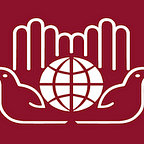Climate Change and Displacement in Mali and Beyond
New York — Perhaps no region in the world has dealt with the disastrous effects of climate change more than West Africa. A shrinking Lake Chad, coupled with persistent drought, has stripped communities of water, fueling conflict and driving displacement that has caused what some of have called the world’s most complex humanitarian disaster.
IIHA Water and Migration Fellow Isaie Dougnon, PhD is investigating this phenomenon in Mali, researching the links between climate change, migration and conflict while considering how socio-cultural factors influence how local populations respond to such crises. Through his research, the Institute aims to propose new strategies and mechanisms for responding to the crisis in the Lake Chad region and Niger River basin.
The transitional zone between the Sahara desert and savanna in sub-Saharan African, known as the Sahel region, has been especially affected by climate change. Mali, for example, has seen a 30 percent decrease in average rainfall and severe drought since 1998 as seasonal droughts have become more frequent and severe. In 2017, OCHA warned of the escalating humanitarian needs in Mali as conflict and violence (often arising over natural resources) consequently force many Malians to migrate to other regions of Africa and Europe. Regionally, more than 3.5 million people in the Sahel face food insecurity, according to UN OCHA.
In the wake of this crisis, various organizations have sought to alleviate worsening conditions in the Sahel region through mechanisms like the 2017 Humanitarian Response Plan. Like many humanitarian initiatives, the plan fell significantly short of its funding objectives with only 12% of its $293 million budget received.
Dr. Dougnon has studied ecological displacement for much of his career and has examined migration in West Africa using both historical and anthropological approaches to offer a more local perspective in colonial and post-colonial Africa analyses.
From 2008 to 2012, Dr. Dougnon directed the UNESCO-University of Bamako research program “Water and Migration” where he was able to establish a clear link between migration and water scarcity by studying Malian populations living near waterfronts. He also directed a project called “Anthropology of Water,” which provided him the initial framework for the Water and Migration Project he currently pursues with the IIHA.
At Fordham University, Dr. Dougnon will investigate themes of social conflict and peace surrounding resource management, religious practices related to water, the impact of climate change on populations’ adaptability, and water management. He will also research the relationship between drought and migration and the effects of migration on rural development and political participation.
“There has been a lack of serious engagement with local expertise about what is needed and how it should be provided, which can lead to ineffective projects as well as disputes between aid groups and Sahelian populations.” — Dr. Dougnon.
Through his research, he intends to spotlight local stories, perspectives, and practices in order to improve humanitarian intervention in Mali. He will also work with graduate students to conduct trainings, primary research, and project implementation.
According to Dougnon, “The research component in this project will shed light on the inventive ways that communities have responded to changes in water resource availability, often by establishing new migration patterns. By uncovering this important local knowledge and training students in rigorous research methods that privilege the perspective of local actors, we can develop new ways to improve the livelihood of rural and urban riparian communities in the Sahel. Such research will also help safeguard and valorize the environmental and cultural values related to rivers and their tributaries.”
As the discourse surrounding climate refugees evolves in the humanitarian sphere, this research is increasingly paramount. The IIHA is proud to support this research initiative which it believes will contribute to a more culturally-specific and locally driven humanitarian response that adapts to the challenges of climate change in Mali and throughout the surrounding region.
Angela Wells, IIHA Communications Officer
Noel Langan, IIHA Communications Intern
Kayla Straub, IIHA Communications Intern
